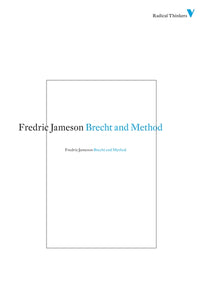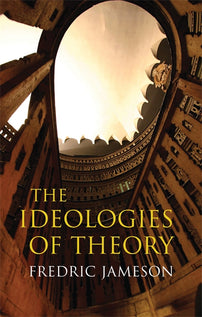On Brecht and Method
Olivier Neveux revisits Fredric Jameson's Brecht and Method for our Jameson at 90 series.

It took quite a sense of historical untimeliness to publish a book devoted to Brecht on the occasion of the centenary of his birth. At that time, the playwright was treated like a dead dog, caught up in the obliteration of anything remotely signifying Marx, despised or academised and – worst of all in the artistic world – outmoded. In this respect, what is striking in reading Jameson’s powerful book, more than twenty years after its publication, is its relative indifference to current events; Brecht is not a banner here, a denigrating response to the failure of actually existing socialism or the name of a boastful claim in the face of neoliberal victory, but the object of a study, and this study is propitious for Marxists. In a way, continuing with Brecht without making him a totem (remember the playwright's warning: ‘don’t connect with the good old, but rather with the bad new’).
The choice and status of Brecht raise questions; he was not a philosopher, his thinking on art is precisely captured in his art, and the commentaries that accompany it are dialectical – and manifest – moments that spur new work. Jameson does not treat him as a philosopher, any more than he really treats him as an artist of the theatre. He reads him. We need to say a few words about the method adopted: this constantly combines a view from above, macro-historical or totalising Brecht’s work, with an approach from below, horizontal (a few lines, a poem, an extract). The text runs its course; Jameson moves quickly, gliding or leaping in a tightly organised fashion from one proposition to another, taking up Brecht’s work to make use of it, and projecting it into major questions about literature and politics, which he subjects to his interpretation of Brechtian ruses and efficacy. More precisely, he links his propositions both to Brecht’s own texts and to readings that do not have Brecht as their subject.
[book-strip index="1"]
In search of what? It is striking that his text, in contrast to so many studies of the playwright, does not come to tell his ‘truth’, to explain his major ‘terms’, such as ‘alienation’ or ‘epic theatre’; nor, fortunately, does it even offer an entrance key. Rather, it takes Brecht at his word on the consequences of his art. Consequences that are at work in Brecht: practical consequences, envisaged and theorised, but also consequences for what a work is and for the place it occupies in a historical moment and a social process.
Being unconcerned with the art of theatre – except in a few remarks, as provocative as they are stimulating, such as those on the question of identification – and uninterested in the ambiguity inherent in dramatic embodiment; in short, freed from the (albeit decisive) question of the stage, Jameson paradoxically rediscovers what had been covered up by customary usage, what Bernard Dort, who was an introducer and activist of Brecht’s work, denounced as the petrification of ‘process into procedures’. The dialectician Jameson reads the dialectician Brecht by the yardstick of the ‘Grand Method’. Dialectics and reconstitution of the work, its pedagogy, its place in the social totality – and its relationship to modernism. So, while it is possible that philosophers and Jamesonians will find things of interest for them here, and strong points for reflection, amateur ‘Brechtologists’ and ‘Brechtians’ will certainly discover, through the scattering of often surprising and counter-intuitive propositions (effect V), how to make Brecht’s work function differently, its usefulness and its uses, and will draw from it still more widely avenues for thinking, for example, about signs, allegories and so on. It is also important to mention the singular place occupied by the novum, the admirable pages on proverbiality and the insistence on the negative. But we must stop here.
[book-strip index="2"]
One last thing: Jameson doesn’t bother with those academic obligations that have become neutralising. No state of the art, no formal discussion of this or that interpretation. This freedom is not the least bequest that his book offers. It reveals everything that is involved in opting for a creative reading – like a constantly repeated phrase that seeks in the object it faces the consistent and determining negativity of its freedom.
Translated by David Fernbach
See all works by Fredric Jameson here. His new book, Inventions of a Present: The Novel in its Crisis of Globalization is out on May 7.
[book-strip index="3"]




